Foster John Barnett (OB1955-1962)
I know you will be saddened to learn that our friend, and stalwart Old Bancroftian, Foster John Barnett passed away on Wednesday 7th October 2020…a wonderful chap and companion of many.
John Dadson
Foster John Barnett (OB 1955 – 1962) sadly died on 7th October 2020. His funeral was held on 12th February 2021 at All Saints’ Church, Chigwell Row, and he is buried in Chigwell Cemetery alongside his beloved wife Marion who had died earlier in the year. Six OBs attended the funeral, and Carmen Bancroftianum was sung at his graveside following the Committal.
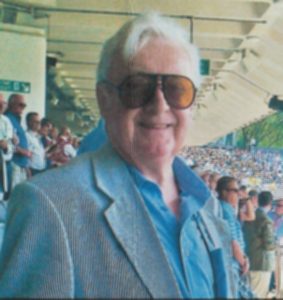
Born in Llandudno (to avoid the Luftwaffe’s bombs) on 12th February 1944, Foster joined Bancroft’s as a boarder in September 1955. The son of John Barnett (OB 1908 -1914), he inherited his mother Jo’s love of music and drama rather than his father’s prowess on the sports field, but was much loved by both.
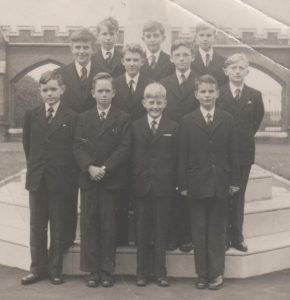
There were only eleven boarders in Foster’s Class of ’55 (left), all in School House and a very tight-knit group.
Back row : Keeble, Barlow, Gregory
Middle row : Sharpe, Hembling, Thompson, Barnett.
Front Row : Fundell, Chipperfield, Dowson, Smith.
My earliest memory of Foster was an occasion when some of us “new bugs” from the Third Form were queuing for the tuck shop, next to the cricket pavilion, at the end of the afternoon. Foster and a friend, both in the Remove, were attempting to push in front of us, claiming that older boys had pushed in front of them when they were “new bugs”, and now it was our turn to give way. I was having none of this, and we ended up scrapping on the floor. The monitor running the tuck shop sent us both off to do a twenty minute quad walk. This completed we decided we would be friends, and returned to the tuck shop, only to find it shut. This is often the way friendships begin.
Foster found boarding life as challenging as anyone, but made full use of the opportunities Bancroft’s offered him. He was an early chorister in the Boarders’
Chapel Choir where his musicality was spotted and encouraged by Don Francombe, who soon recruited him to the School Choir then to the Combined Choir, a joint venture of Bancroft’s and Loughton County High School for Girls. This gave him the experience of singing a wide repertoire in such prestigious venues as St Martin-in-the-Fields and St Bartholomew-the-Great. One adventure was going to the Abbey Road Studios with the choir to record a piece by Carl Orff, walking over the famous zebra crossing long before the Beatles. One undertaking of the Combined Choir was to work with local primary schools in a production of Benjamin Britten’s Noye’s Fludde at St John’s Church, Loughton, in which Foster played a leading part. He also threw himself into drama, appearing in school plays in both large and small parts. Under the inspiration of Don Francombe he had major parts in Sophocles’ Œdipus Rex and Christopher Fry’s Boy with a Cart – as well as in Shakespeare. He played the lead in Hamlet at the age of sixteen (below).
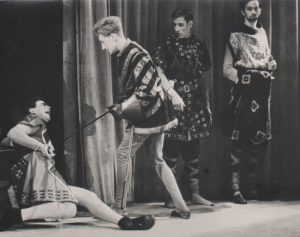
A natural mimic, he entertained us in the annual end of term Bancroft’s Players’ Reviews with his wicked impersonations of the masters – including Mr Francombe. He had the actor’s ability to move from comedy to tragedy and back, seemingly with no effort and was able to find humour in the most commonplace situations.
I got to know Foster well during my first seas scouts’ Broads cruise, when we were both assigned to the same four-berth boat. I had my fishing rod with me, and one early evening we were lying to the mudweight in Horsey Mere. I was catching a few fish, watched by Foster who asked if he could have a go. I handed my rod over, and he soon landed a nice half pound roach. He was metaphorically hooked, and continued to borrow my rod (which I had made myself) till the end of the week. The next time we visited the Broads he asked if I could make him a rod ? He had an old reel, but new boat rods were at least £5, a small fortune in those days. I had built my rod for about 10/- (50p in today’s money), which was the cost of the rod blanks, rings, whipping twine, varnish and cork handle. I agreed, he gave me the ten bob, and I made him his rod.
Nearly fifty years later, when I met him again at the Class of ’56 Fifty Years-On OBs’ Day, his first words were “You made me my first fishing rod !” I discovered he had become a passionate fisherman – coarse, game and sea. He had used the rod I made until about ten years previously, and by the end of the day we had agreed to go fishing together again – which we did for the next ten or more years.
Foster made friends very easily, but a special friend at Bancroft’s was Ian Dowson (OB 1955 – 1961), a fellow boarder. The two boys took it in turns to stay with each other during the school holidays, Foster with Ian’s family in Little Oakley, near Harwich, and Ian with Foster at Whitstable in Kent. Both homes were by the sea, and the boys gained a love and knowledge of nature and wildlife, walking along the muddy foreshores of the Walton Backwaters and the Thames Estuary. Around ten years after this Ian asked Foster to be his Best Man when he married Maureen, and no less than twenty-five years later was able to reciprocate by being Best Man at Foster’s own wedding.
When Foster was about to sit his O-levels in 1960 he heard from home that his father had died. This was not totally unexpected. As a young army lieutenant John Barnett had been badly wounded at Passchendaele during the Battle of Third Ypres, and was invalided back to Blighty in 1917 minus a lung and a leg. Foster coped with the bereavement, and took on the responsibility of being the man of the family and caring for his mother and sister, Ann. Ian and Foster’s fellow boarders supported him and helped him through a difficult time. This was in the days before bereavement counselling, when one was expected to cope with grief by buttoning-up, and carrying on.
Foster carried on into the VIth form, studying English, History and Geography at A-level, and losing himself in his acting and singing. (He even joined amateur dramatic and choral groups in Whitstable during the school holidays.) He was made Head Boy during his last year at Bancroft’s, and Head of School House, where he was a firm but fair monitor.
On leaving Bancroft’s he started a career in Sales, working in London for Cazaly, Hillstead & Cavendish office furnishers. A school contemporary recently said “When we were at school whoever would have thought of Barnett going into Sales ?” I can confirm Foster’s salesmanship powers. He once persuaded me to go to sea in a small boat to catch cod one January when the sky was more black than blue, and we returned early back to port in a whiteout blizzard ! Foster thrived in a Sales environment, and his customers appreciated his concern for their needs, his reliability and his willingness to go the extra mile. Monday to Friday he was the dedicated businessman. Weekends were another matter.
From 1968 to 1973 he shared a number of houses in the Woodford and Loughton area, mainly with Vic Bones (OB 1956 – 1963) and once with John Dadson (OB 1962 – 1967). John recently wrote : “I can count on one hand the number of people with whom I can associate the words an absence of malice, huge integrity, an abundance of mischief – and an enormous capacity for fun”.
After Bancroft’s he soon moved into amateur dramatics and light opera, particularly Gilbert and Sullivan, and would fill the house with his powerful tenor tones. When trying to blot out the tedium of Saturday morning housework he would rehearse his lines to the background of the Hoover droning from room to room.
Foster’s cat Tibs got pregnant and he determined she must have the finest maternity care available in Loughton. After a ten seconds examination the vet smiled as he said “Ginger Toms don’t have kittens !” Years later he would phone Vic to say, stifling giggles : “Bonesey, Ginger Toms don’t have kittens !” followed by roars of laughter. In his defence it should be noted that we boys didn’t study biology at Bancroft’s in the 50s and 60s – and didn’t have any sex education (at least, not as part of the curriculum).
He began a lifelong association with LADS, the Loughton Amateur Dramatic Society at Lopping Hall, clocking up more than 75 plays in over 45 years.
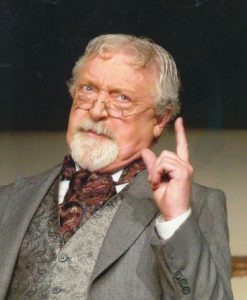
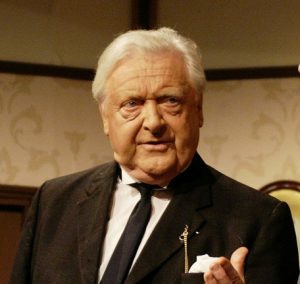
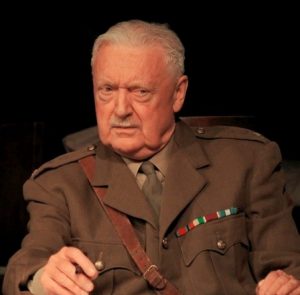
Foster loved everything to do with being on-stage – from the rehearsals to the final performance. He always arrived at rehearsals with the accoutrements his character needed, whether it was a walking cane, a pair of glasses or a hat, so that he could rehearse with them from the beginning. In preparing this obituary I received many glowing tributes from his friends in LADS who remember him as a dedicated actor and loyal friend. He was always the first to talk to new members and make them feel welcome, engaging them in conversation and finding out about their experiences in theatre.
A pretty young actress at LADS caught Foster’s eye quite early on, and they became good friends. Marion, however, was the only child of frail elderly parents, and did not feel free to marry. Once her parents had both passed Foster plucked up courage, on his fiftieth birthday, to propose. To his delight Marion accepted, and they enjoyed twenty-five years of happy marriage.
Foster spent several years at Cazaly Hillstead, then made a career move into pharmaceutical sales. He was successful here, but missed the work environment of office sales and moved to Quay Office Furnishers in Woolwich as a sales executive. Quay had the Transport for London contract, and Foster had the satisfaction of equipping several of this body’s new developments. He was at Quay for twenty-five years, and was well-respected in the organisation.
A former colleague, Alex, was a partner in crime on many of Foster’s fishing trips, and latterly I enjoyed his company too. Alex was involved in a severe road accident during his time at Quay, and was always grateful for the support and care Foster offered during his lengthy rehabilitation. I was pleased Alex made the effort to attend Foster’s funeral from his home in South London, even though walking for him was still difficult. He wrote afterwards, “Foster was a true friend, and a lovely caring man. I miss him so much”.
During the last weeks in his dementia care home in Fencepiece Road, Chigwell, Foster steadily withdrew from the world. John Harris (OB 1956 – 1963) and Sue Miller, wife of the late Peter Miller (OB 1956 – 1963) and a dear friend of both Foster and Marion, had visited him regularly during his three years at the home and let him know he wasn’t forgotten, particularly after the sad death of Marion in March. They brought him small luxuries and a supply of his favourite biscuits. Both had spent much time supporting Marion during Foster’s early days in the home, and then caring for her during the final weeks of her own terminal illness.
Despite not inheriting his father’s sporting ability, Foster still retained a keen interest in rugby, taking every opportunity to visit Twickenham, and in cricket, being a frequent spectator at Lords and the Oval. Living in Essex he was also to be seen at the Chelmsford County ground with Ian during the cricket season, though Kent was always his county. Shortly before he died, John, Vic and Chris Warne (OB 1956 -1963) spent an hour or so with him reminiscing, hoping to trigger a response but without success. Just as they were leaving Vic asked Foster if he remembered the Lancashire versus Kent Gillette Cup Final at Lords back in the early 70s ? Silence. “When we met some of the Kent players behind the pavilion ?” Silence. “Do you remember chatting to Derek Underwood ?” Silence. “He bowled for Kent”, said Vic. Foster leaned forward and, with emphasis, replied : “And England”. It was wonderful.
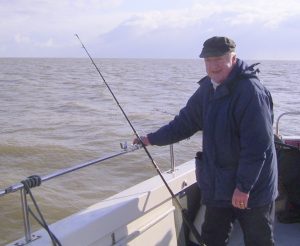
I last saw him in August last year, together with Johnny Harris, on a baking hot day when visitors to the home could meet residents on the patio outside (socially distanced and masked). I took with me a CD player and a recording of the Copped Hall choir with which Foster used to sing. Foster kept nodding off in the heat, and was fairly monosyllabic in his speech. But his gaze was on the CD player, and his finger tips tapped lightly in time to the music. He was in the care of a lovely young man named Blessing (working to pay for his MBA at London University) who was most attentive to Foster’s needs. Someone else I was pleased to see at the funeral.
Foster’s fellow boarders during his time as Head of House will remember his fine “All in”, all the way from the foot of the main staircase and along the corridors to the Dining Hall without pausing for breath. It is sad that such a fine voice will be heard no more. But we can all celebrate a life well-led, and I believe plans are being made to hold a celebratory service – for both Foster and Marion – in the School Chapel, once normal times return.
Don Baines
(OB 1956 – 1962)
Postscript : OBs present at Foster’s funeral were : John & Joan Harris;
Vic & Christine Bones; Sue Miller (wife of the late Peter Miller); Ian Dowson, John Dadson ; Mike Stout; Don Baines.
What a superb obituary Don Baines has written for Foster Barnett. It has triggered so many emotions from pride to sadness; the host of memories it has unlocked is moving, uplifting and inspirational. Thank you Don and all who treasured and nurtured Foster. The photograph of the 11 “new bug” boarders in 1955 is a memory-jerker in spades! All the reminiscences are spot-on. The tuck shop – oh, yes! Was it Solo Orange sold there for sixpence or was that at the Calypso? Together with Lonnie Donnegan on the juke box and Telstar by The Tornados … and Braeside girls.
But my favourite part of the obituary – and it really sums up Bancroft’s – was the section on school plays and the action-photograph. To quote: “He played the lead in Hamlet at the age of sixteen …” Don Francombe has turned in his grave several times. The play was King Lear … and Foster played the part of Edgar, seen despatching his brother, Edmund. The lead was actually Gordon Craig (what happened to Gogs?), and the best actor of our vintage was, in my view, Neil(?) Keeble, who played Gloucester, not pictured. One of Edmund’s great lines (especially for a schoolboy), before being skewered by Foster was: “ God, stand up for bastards!” Why do I recall this so clearly? Yes! I was Edmund. My previous role had been the Voice of Christ in the Chester Mystery Plays. Mr Francombe and everyone else (except my dear mother!) thought I was much better cast in Shakespeare.
As Head of West House I looked up to Foster as Head Boy and Head of School House – primus inter pares. I loved the pictures of characters he played in his prolific amateur dramatics career, and wish there had been an opportunity to say to him, ”Cor, Foster, you’re so like Simon Russell Beale!” I would have told him that in 1976, as a British Army major seconded as a student to the Indian Defence Services Staff College, I played the lead in the English language play, Lord Arthur Savile’s Crime by Oscar Wilde. The best actor, by far, was the butler played by an Indian army officer and not at all modelled on Peter Sellers! In the College’s Hindi play I was a non-speaking water carrier. Foster would have liked that.
The names mentioned in Don’s obituary come readily to mind: Johnny Harris – a peerless cross country runner; Ian Dowson; Vic Bones (a tough scrum half); John Dadson; Chris Warne; Pete Miller – a fine sportsman, so sad to hear of his death; and all the others.
And finally “All in” with Foster, like a muezzin, calling the faithful to eat. Rest in Peace.
Best wishes; Floreat Bancroftia.
Patrick Shervington (OB 1955-1963)
